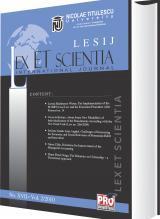PROCEDURAL IMPLICATIONS OF THE ILLEGAL ADMINISTRATION OF EVIDENCE DURING A CRIMINAL TRIAL
PROCEDURAL IMPLICATIONS OF THE ILLEGAL ADMINISTRATION OF EVIDENCE DURING A CRIMINAL TRIAL
Author(s): Bogdan-Florin MicuSubject(s): Law, Constitution, Jurisprudence
Published by: Universitatea Nicolae Titulescu
Keywords: administration of evidence; criminal trial probation; legality and loyalty principles; Criminal Procedure Code; criminal framework
Summary/Abstract: As the title suggests, the purpose of this study is to analyze the procedural implications of the illegal administration of evidence. The present paper begins with a short presentation of criminal trial probation, and continues with the analyses of the conditions with which a proof has to comply in order for it to be administered in the trial, as well as the analyses of the procedures of administration themselves. Another part of the study deals with the principles that should govern the administration of evidence during the criminal trial, respectively the principle of legality and loyalty (regulated in article 64 respectively 68 of the Criminal Procedure Code) as well as the European Court of Human Rights regulations. In spite of the weak criminal framework that exists regarding the illegal administration of evidence, the outcome of a trial can be radically changed based on how the evidence is administered. Therefore, this study also focuses on the consequences of the illegal administration of evidence in the criminal trial, which will be dealt with by analyzing which sanction should be applied, if any exists. The study will not be based solely on the normative guidelines, but also on the judicial practice contained in decisions, which exist in this criminal framework, given by various courts in the country. Last, but not least, this study shall present the legal changes which will occur once the new Criminal Procedure Code shall come into force.
Journal: LESIJ - Lex ET Scientia International Journal
- Issue Year: XIX/2012
- Issue No: 1
- Page Range: 107-115
- Page Count: 9

